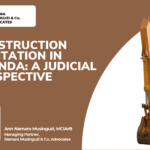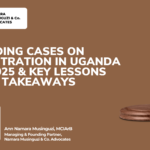Aboneka Michael & anor V Watoto Church Ltd Constitutional Petition No. 019 of 2018 [2023]
Attention!
Article 29 (1) (c) of the Constitution gives different institutions and organizations discretion to determine their own practices. A citizen of Uganda is at liberty to choose to belong to that organization and manifest their practices or not. If one is not comfortable with certain practices in that organization, they have a right to leave it.
Background to the case.
The Petitioner petitioned the Constitutional court seeking a declaration that the Respondent’s mandatory requirements for a letter of blessing from the bride’s parents or guardians, HIV testing and counselling report from three specific medical centers, pastor’s interview with the intending couple and consent or blessing from the parents of the bride are unconstitutional and contrary to Articles 31, 27 and 33 (4) and (6) of the Constitution of Uganda. Two issues were raised for the determination by the Court:
- Whether certain provisions of the Respondent’s wedding guidelines offered the relevant provisions of the Constitution.
- Whether the Petitioner is entitled to the remedies prayed for.
Ruling of the Court of Appeal
In dismissing the petition in its entirety, the Constitutional Court held that when an institution of worship makes decisions in a thoughtful, sensitive, non-discriminatory, and participatory manner balancing all the relevant considerations, the court would not interfere with their decisions or practices. This is because these institutions enjoy a degree of autonomy that must be respected by courts of law. It therefore followed that all the Respondent’s “wedding guidelines” were not unconstitutional but rather were necessary to facilitate and achieve its obligations.
Effects of the court’s Ruling
The import of this ruling is that so long as the guidelines and practices of an organization are in tandem with the Constitution, there is no bar from the institutions implementing the same and it also follows that Courts of law cannot interfere in the same.
Conclusion
This decision is a new dawn regarding freedom of Worship. It is now settled that Institutions of Worship enjoy a great degree of autonomy to make their own practices and decisions as long as they confirm to the Constitution.
Disclaimer: No information contained in this alert should be construed as legal advice from Namara Musinguzi & Co. Advocates or the individual authors, nor is it intended to be a substitute for legal counsel on any subject matter
Prepared By:
Ann Namara Musinguzi (Managing Partner)
ann@namaralaw.com
Ainomugisha Anita ( Legal Associate)
anita@namaralaw.com



